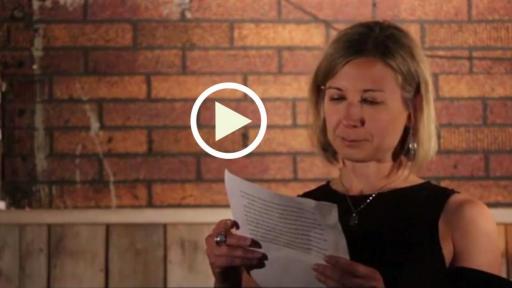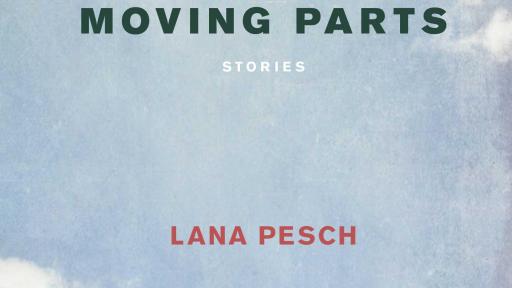Moving Parts by LANA PESCH
Dark, funny, and off-kilter stories about the moving parts to being human.
“Lana Pesch’s stories have one foot in the world of Alice Munro –long, deep, satisfying and unsettling in equal measure–and the other foot in a younger, jazzier world where humour is currency and the sentence is king.”
—Annabel Lyon, author of The Golden Mean and The Sweet Girl
“This is a boffo collection. Lana Pesch writes with intelligence, humour, and compassion. Her stories show the brokenness of being human, but with lightness and verve.”
—Sarah Selecky, author of This Cake Is for the Party
“Witty, moving, urbane, and thoroughly modern, Moving Parts is a knockout collection. A hip cross-country tour of today’s North America.”
—Arjun Basu, author of Waiting for the Man
CNW, Toronto, October 5, 2015
A blind date blooms in a grocery store parking lot. Lake Erie forms the backdrop to a botched assisted suicide. A neurotic, dog-loving caretaker writes a complaint letter after an unfortunate leg-waxing incident. While his uncle lies in a coma, a young man befriends a homeless man who may or may not be dead. A coming-of-age road trip includes a tense situation with a gang of professional lesbian arm wrestlers and an erotic ocean encounter with a man with a hoof. A plane crash on the BC coast brings a frustrated artist and hardened bootlegger together in a dire situation. These flawed, often broken characters seek meaning, acceptance, and closure under extraordinary circumstances ... though not necessarily in that order.
Insightful and heartbreaking–with the occasional sharp turn towards the surreal–Moving Parts is a collection of deeply imagined, darkly funny short stories. Pesch’s writing is surprising, charming, and unsettling. Her characters are raw and inappropriate, loving and confrontational and completely recognizable.
Moving Parts is a provocative debut that establishes Pesch as a writer to watch.
Lana Pesch will be touring in Canada this fall with events in Toronto, Montreal, Melville, Regina, Saskatoon and Vancouver (see below for details).
Lana Pesch will be available for appearances and interviews. Please contact Cynara Geissler at [email protected] with interview and publicity requests.
LANA PESCH is an alumna of the Banff Wired Writing Studio and her short fiction has been published in Little Bird Stories: Volumes I and II. She was longlisted for the 2014 CBC Short Story Prize and won the Random House of Canada Creative Writing Award at the University of Toronto in 2012. Moving Parts is her first book.
She lives in Toronto.
MOVING PARTS Canadian appearances fall 2015
TORONTO, ON
Sunday, September 27, 2015 | 4:30-5:30pm. Word on the Street | Harbourfront Centre
Greg Hollingshead, Lana Pesch, and Casey Plett present their short story collections, putting quirky and unpredictable twists on slice of life tales.
Wednesday, October 7 | 7-10pm Toronto launch party! | Monarch Tavern | 12 Clinton St.
Hosted by Carried’Away. Interview with Kathryn Kuitenbrouwer. Live music by Carrow. Guest readings by Jess Grant and Adam Giles. Book sales by Another Story Bookshop.
Tuesday, October 27, 2015 | 7pm. Boneshaker Reading Series | Toronto Public Library | 1748 St. Clair Ave. West
Lana will read with other special guests TBA.
MONTREAL, QC
Wednesday, October 21, 2015 | 7-8:30pm. Concordia Co-op Bookstore | 2150 Rue Bishop
Multi-reading featuring Lana Pesch (Moving Parts), Suzanne Alyssa Andrew (Circle of Stones), Becky Blake (2013 CBC Short Story Prize winner) and Laurence Miall (Blind Spot). Hosted by filmmaker and journalist Marites Carino.
VANCOUVER, BC
Thursday, October 29, 2015 | 7-9pm. Location TBD Real Vancouver Writers’ Series co-presented by the Literary Press Group of Canada
Lana will read with other LPG authors as part of the Real Vancouver Writers’ Series.
REGINA, SK
Sunday, November 1 | 2-4pm. Artful Dodger Cafe and Music Emporium | 1631 11th Avenue
Lana will read from and sign copies of Moving Parts. Joint reading with Suzanne Alyssa Andrew (Circle of Stones). Bernadette Wager will also read from new work.
SASKATOON, SK
Monday, November 2 | 7-9pm. McNally Robinson Bookstore | 3130-8th Street East
Lana will read from and sign copies of Moving Parts. Joint reading with Suzanne Alyssa Andrew (Circle of Stones).
MELVILLE, SK
Wednesday, November 4 | 3-5pm. Chocolate Bean Cafe & Gift Shop | 101 3 Avenue West
Lana will read from and sign copies of Moving Parts.
Additional appearances are planned for spring 2016. Please visit lanapesch.com/events for more details.
Moving Parts by @lanapesch is a provocative debut collection of deeply imagined, darkly funny stories. Tweet
For immediate release
Q & A with author Lana Pesch
“I am fascinated by human behavior–the extremes of both good and bad, and the spectrum in between. We are a flawed species, in my opinion. Always making mistakes. But we learn by failing.”
Q: Let’s talk about the short story form. How should short stories work?
A story should leave you affected somehow, itchy, shocked, enlightened, comforted, wondering, maybe in a state of self-reflection. They should resonate, linger, and stay with a reader after the book has been put away. Stories should make us wonder and question, and hopefully, shape us into becoming more compassionate human beings. A good story should make you feel less alone. As readers, we might recognize ourselves in a story, we might learn something, or be changed in some way–large or small.
I think stories matter, ultimately, for that connection between writer and reader. For me, both reading and writing are ways to process things I find difficult, absurd, unfair, sorrowful. Stories are a way to enjoy and celebrate language, to have a laugh, employ empathy. Ordinary subjects matter. Alice Munro writes, “The complexity of thing–the things within things–just seems to be endless. I mean nothing is easy, nothing is simple.”
Stories should convey human emotion through language. Ben Marcus also writes, “…language is the true code of our inner lives, and to be a story writer is to know this, to tap into and reveal those ways of personal address we reserve for the private, necessary messages we send ourselves, when we think no one is listening.” Good grief, yes! Because the fact is, somebody is listening.
To quote Thomas King, “The truth about stories is that is all we are.”
Q: How long have you been working on this collection?
I’ve been working on this collection since 2008. The first story I had critiqued was “Habits of Creatures.” It looked different back then. I never set out to write a book, but after a while the stories started to pile up so I called Sarah Selecky and said, “Now what?” And she told me I had written a collection. It sounds simple, but it wasn’t. It was a lot of work. A lot of pushing through a lot of resistance.
Q: What is your writing process like?
I write all my first drafts by hand. Long form, in a notebook. I would have never done this six years ago, but now I can’t do it any other way. Eventually I transcribe the work to a computer. Then come the revisions. Lots and lots and lots of revisions. I am a chronic tinkerer.
I prefer to write in the morning when my mind is clearer, more open, and there’s less clutter, less distraction.
My stories usually start with character and I often use prompts to kick start the story into action. There is plenty of free-writing and not knowing at first. It has taken me a long while to come to being comfortable with being uncomfortable. I’ll choose a point of view and go from there. Kernels of ideas can come from all sorts of places: the news, eavesdropping, things that have happened to friends or family, photos, magazine articles, my husband, our future as a species, death.
Q: Many of your stories involve characters who are, at best, stuck, at worst, broken–can you say more about this theme in your work?
I am fascinated by human behavior-the extremes of both good and bad, and the spectrum in between. We are a flawed species, in my opinion. Always making mistakes. But we learn by failing. I’m attracted to writing about characters who are in trouble or stuck or broken because I’m curious about the choices a person makes and the consequences of those choices. How does a person arrive at a decision and what is the outcome? How do they reconcile that outcome? What next? Why now?
Sometimes I write to try and better understand something, be it murder, heartbreak, or longing. Sometimes through my writing, I’m trying to gain a deeper understanding of a situation–something good or something heinous. The writing can end up raising unanswerable questions, or inexplicable moral paradoxes.
Fundamentally, we, as humans, are seeking: acceptance, connection, recognition, safety, love, praise, joy, pleasure, closure, a sense of belonging, and purpose. It’s how we attain any of these things I find interesting. My writing is a lot more journey than destination.
Q: Moving Parts features some weird and great sex scenes—one involving a tree, another involving an ocean and a man with a hoof for a foot. CanLit kind of has a reputation of being very vanilla when it comes to coitus. Do you have a the-weirder-the-better bent when it comes to writing about sex?
No, but it’s fun to learn that it can read that way.
Sarah Selecky’s advice at one point was: “Whatever you think is weird, or uncomfortable, or inappropriate, or makes you nervous…write that.” So I tried not to overthink the sex scenes, or any of my writing. I didn’t think about who was going to read it or like it or not like it and I wrote from the character’s perspective. I took away any restrictions or boundaries or limits and let them do whatever they needed to do. I was in the point of view of the character, and they did all the work.
Q: What books/authors would be great drinking buddies with Moving Parts?
The ultimate cocktail party would include: Jonathan Lethem’s Men and Cartoons, George Saunders' CivilWarLand in Bad Decline (or Tenth of December), Julie Hecht’s Do The Windows Open?, and Jessica Westhead’s And Also Sharks.
Sitting at the table next to us would be: Alice Munro’s Runaway, Annabel Lyon’s Oxygen, Douglas Glover’s Savage Love, Zsuzsi Gartner’s Better Living Through Plastic Explosives, and Miranda July’s No One Belongs Here More Than You.
We’d all play musical chairs and there would be a lot of whiskey and vodka, and clinking and chatter.
Q: You’ve written screenplays and plays and you work as a television producer. What have those experiences given you that you bring to your fiction writing?
My experience with writing dialogue spills over from the screen (or stage) to fiction. I enjoy writing dialogue. I also have background in theatre, where dialogue is integral. Also listening. Producers have to listen intently all the time. It helps as a writer to listen to what’s not being said.
Because TV and video is a visual medium, and writing is rooted in language, it’s an interesting experiment to combine the two. I think visually when I’m writing, but tell the story through language. It’s a good combo. It comes back to character. On the screen or the page. It makes all the difference if I can write authentically from the point of view of a character. Speak their truth, tell their story, in their world.
END
TITLE: Moving Parts
ISBN: 978-1-55152-624-9
EPUB ISBN: 978-155152-625-6
(check your favourite retailer)
5.5 x 8 | 272 PP | PAPER
$17.95 CDN
Fiction, Short Stories
PUB MONTH: OCTOBER 2015
REPS: Ampersand, Inc.
Distribution : UTP
Lana Pesch will be available for appearances and interviews. Please contact Cynara Geissler at [email protected] with interview and publicity requests.
Cynara Geissler
Marketing Manager
Arsenal Pulp Press
[email protected]
604-687-4233
FAX 604-687-4283
WEB- arsenalpulp.com
TWITTER - @Arsenalpulp
FACEBOOK - Arsenal Pulp Press
INSTAGRAM: Arsenalpulp
BLOG: Arsenalia.com




